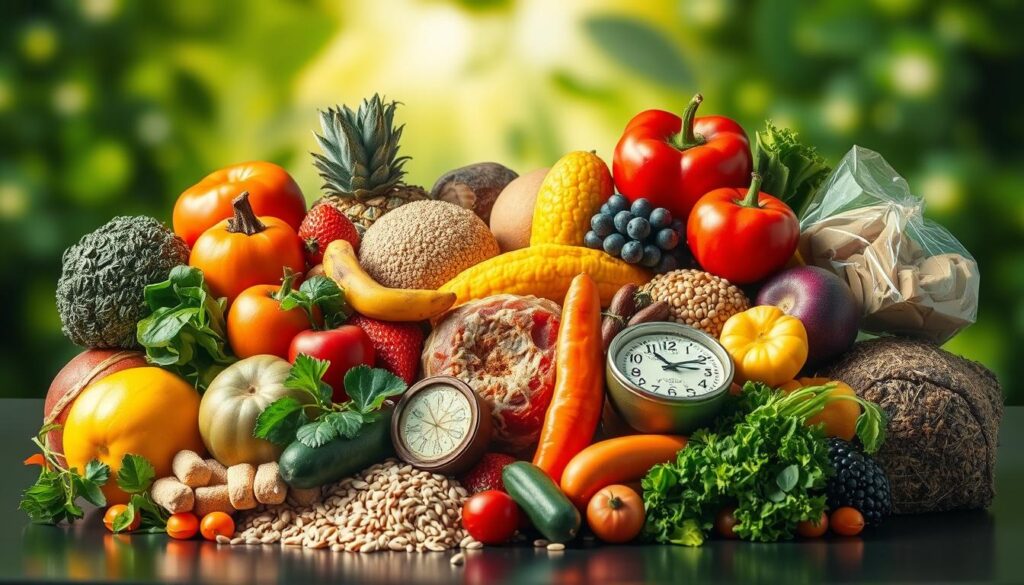All living things, from tiny microbes to huge whales, need food. Nutrition is key for survival. This guide will look at why do organisms need to take food is essential for energy, growth, and health.
Food is vital for life. Plants, predators, and decomposers all need it to survive. Let us understanding, we can appreciate the complex web of life and its balance.
The Fundamental Need for Food in Living Organisms
In the intricate web of life, all living things need food. Food is the source of essential nutrients that keep biological processes going. These processes are key for cellular function and health.
The Basic Building Blocks of Life
At the cellular level, food gives the building blocks for important biomolecules. These include proteins, lipids, and nucleic acids. They are the base of cellular structure and help with vital cellular functions.
Without these nutrients, cells can’t function right. This could threaten the survival of the organism.
Role of Food in Cellular Function
The essential nutrients from food also power energy-making in cells. Through complex metabolic pathways, they turn into ATP. ATP is the energy that drives many cell activities, like sending signals and dividing.
| Macronutrient | Function |
|---|---|
| Carbohydrates | Primary source of energy for cellular processes |
| Proteins | Building blocks for structural and functional proteins in cells |
| Lipids | Essential components of cell membranes and for energy storage |
Understanding food’s role in cellular function and biological processes shows its importance. A balanced diet is key for health and well-being in living organisms.
“Food is the fuel that powers the machinery of life, nourishing cells and fueling the intricate dance of biological processes.”
Why Do Organisms Need to Take Food: A Biological Perspective
Nutrition is key for all living things to survive and thrive. From a biological view, food is needed for life’s complex processes. It gives energy, nutrients, and building blocks for life’s functions.
At the basic level, food is vital for cells. Cells need energy to work, grow, and divide. They get this energy by breaking down food’s nutrients, a process called cellular respiration.
The nutrients in food are crucial for life’s survival and biological processes. Proteins, carbs, and fats build tissues and organs. Vitamins and minerals help with many metabolic and physiological functions.
| Nutrient | Biological Function |
|---|---|
| Proteins | Cell structure, enzyme production, immune function |
| Carbohydrates | Energy production, brain function, glycogen storage |
| Fats | Energy storage, cell membrane structure, hormone synthesis |
| Vitamins | Antioxidant protection, immune support, blood clotting |
| Minerals | Bone health, nerve function, oxygen transport |
The biological necessity of food is clear. It supports life’s complex metabolic processes and physiological functions. From cells to organisms, nutrients are essential for growth, development, and survival.
Energy Production and Metabolism in Living Systems
Understanding how living things make and use energy is key to knowing how they work. At the center of this is ATP, or adenosine tri-phosphate. It’s the main energy source for cells.
ATP Generation and Energy Transfer
Creating ATP is vital for cells to function. Cells use energy from nutrients like glucose to make ATP. This molecule is then used for many important cell activities.
Cellular Respiration Process
The heart of metabolism is cellular respiration. It breaks down nutrients, mainly glucose, to release energy. This energy is turned into ATP, powering many cell functions.
Metabolic Pathways
Living things have complex networks of metabolic pathways. These paths control energy-making and molecule changes. They help turn nutrients into energy and build and break down molecules for growth and repair.
“The ability to convert food into usable energy is a fundamental requirement for all living organisms, enabling them to sustain life and carry out essential functions.”
The Role of Nutrition in Growth and Development
Proper nutrition is key for growth and development in living things. Getting enough nutrients helps tissues grow, repair, and stay healthy. A diet full of essential nutrients helps the body grow and function well.
The growth and repair of tissues like muscles and bones need certain nutrients. Proteins are the building blocks for these tissues. They help cells grow and repair. Vitamins and minerals, like vitamin C and calcium, keep the body working right.
- Proteins: Essential for muscle growth, tissue repair, and overall development.
- Carbohydrates: Provide energy to fuel the body’s metabolic processes and support growth.
- Fats: Crucial for brain development, hormone regulation, and energy storage.
- Vitamins and Minerals: Facilitate enzyme activity, immune function, and bone health, among other vital roles.
Eating a balanced diet is important for growth and health. It helps the body grow strong and stay healthy. This supports growth now and health later in life.
“A healthy diet is the best way to ensure that your body has the nutrients it needs to grow, develop, and function properly.”
| Nutrient | Role in Growth and Development |
|---|---|
| Protein | Supports the growth and repair of tissues, including muscles, organs, and bones. |
| Carbohydrates | Provide energy for cellular processes and support overall growth and development. |
| Fats | Essential for brain development, hormone regulation, and energy storage. |
| Vitamins and Minerals | Facilitate enzyme activity, immune function, bone health, and other vital processes. |
By eating a balanced diet, organisms get the essential nutrients they need. This supports growth and repair and improves health and development.
Essential Nutrients Required for Survival
To stay healthy and thrive, living things need a mix of essential nutrients. These nutrients are the foundation for our body’s functions. They fall into two main categories: macronutrients and micronutrients.
Macronutrients vs Micronutrients
Macronutrients give us energy and are needed in big amounts. They are proteins, carbohydrates, and fats. Micronutrients, like vitamins and minerals, are needed in small amounts but are vital for our body’s systems to work right.
| Macronutrients | Micronutrients |
|---|---|
| Proteins | Vitamins |
| Carbohydrates | Minerals |
| Fats |
Vitamin and Mineral Requirements
Vitamins and minerals are key micronutrients for our health. They are needed in small amounts but are very important. Some important ones include:
- Vitamin A: Helps with vision, immune function, and skin health.
- Vitamin C: Boosts immune function and helps make collagen.
- Calcium: Important for strong bones and teeth.
- Iron: Needed for making red blood cells and carrying oxygen.
It’s vital to meet the dietary requirements for these essential nutrients. This is key for living things to survive and function well.
Food as a Source of Body Maintenance and Repair
Proper nutrition is key for our body’s growth, repair, and health. The nutrients from food help with cell regeneration, tissue repair, and body functions. This section will show how food helps maintain and repair our bodies, highlighting the need for a balanced diet.
Food helps our bodies by supporting cell growth and repair. Nutrients like proteins, vitamins, and minerals are essential. They help replace damaged cells and create new ones. This is vital for fixing and keeping tissues and organs working right.
Nutrition also helps keep our body in balance. Foods with antioxidants and anti-inflammatory compounds fight off stress and inflammation. These are big factors in aging and health problems. Eating foods rich in these nutrients helps our body’s natural healing and metabolism.
| Nutrient | Role in Body Maintenance and Repair |
|---|---|
| Proteins | Provide the building blocks for cell growth and tissue repair. |
| Vitamins and Minerals | Support various metabolic processes and aid in the repair and maintenance of cells and tissues. |
| Antioxidants | Help neutralize harmful free radicals, reducing oxidative stress and promoting overall cellular health. |
Knowing how nutrition supports our body’s growth, repair, and maintenance helps us make better food choices. This can greatly improve our health and well-being.

“A balanced diet rich in essential nutrients is the foundation for a healthy, resilient body that can effectively maintain and repair itself.”
Homeostasis and Nutritional Balance
Keeping the body in balance is key for its proper function. This balance, called homeostasis, is greatly affected by what we eat. It involves processes like keeping the body temperature right and maintaining the right pH levels, which are vital for our health.
Temperature Regulation
Our bodies work hard to keep the temperature just right. This is done through our metabolism, which is powered by the food we eat. Carbohydrates and fats are especially important here, as they give us the energy to stay at the perfect temperature.
pH Balance Maintenance
Keeping the body’s pH levels in check is another important part of homeostasis. Our cells and organs need a certain acid-base balance to work well. The nutrients we eat, like sodium, potassium, and calcium, help keep this balance, keeping our body in harmony.
Understanding how nutrition affects homeostasis helps us see why eating well is so important. A balanced diet not only keeps us healthy but also helps our bodies handle daily challenges better.
The Connection Between Food and Immune Function
Proper nutrition is key to a strong immune system. It’s the body’s first defense against sickness and infection. The essential nutrients in food boost the immune system’s strength. This helps the body fight off harmful germs and stay healthy.
Macronutrients like protein, carbs, and healthy fats give energy and building blocks for immune cells. Micronutrients, like vitamins and minerals, help the immune system in many ways. For example:
- Vitamin C helps immune cells grow and work well.
- Zinc is vital for immune cells to grow and divide.
- Vitamin D helps the immune system respond to threats.
Eating a balanced diet gives the body what it needs for a strong immune system. This lowers the chance of getting sick. On the other hand, not getting enough nutrients weakens the immune system. This makes the body more open to health problems.
| Nutrient | Role in Immune Function |
|---|---|
| Vitamin C | Supports the development and function of immune cells |
| Zinc | Essential for the proper growth and division of immune cells |
| Vitamin D | Regulates the immune system and helps it respond effectively to threats |
Knowing how nutrition affects the immune system helps us make better food choices. This supports our health and survival with a diet full of essential nutrients.

“A healthy immune system is your best defense against illness and disease. Proper nutrition is the foundation for a strong immune system.”
Different Feeding Mechanisms Across Species
In the natural world, many living things have developed unique ways to eat and get nutrients. These ways can be split into two main types: autotrophic and heterotrophic organisms.
Autotrophic vs Heterotrophic Organisms
Autotrophic organisms, like plants and some bacteria, make their own food. They use sunlight or chemical reactions to create organic compounds. This is through photosynthesis or chemosynthesis.
Heterotrophic organisms, which include animals, fungi, and many microbes, eat other living things. They can’t make their own food and need to get it from others.
Specialized Feeding Adaptations
Organisms have developed special ways to eat and survive. For example:
- Carnivores, like lions and sharks, have sharp teeth and strong jaws to eat other animals.
- Herbivores, such as deer and elephants, have special digestive systems to digest plants.
- Omnivores, like bears and humans, eat both plants and animals.
- Filter feeders, such as whales and clams, use special structures to catch small particles from water or air.
These special ways of eating help different species survive and keep the ecosystem balanced. They make sure each species can get the nutrients it needs.
Food Processing and Absorption in Organisms
Metabolism and nutrient absorption are key for organisms to get what they need from food. The digestive system breaks down food into bits that the body can use. It extracts nutrients like carbs, proteins, fats, vitamins, and minerals from what we eat.
How organisms digest food can vary. Some have special organs or enzymes to help break down nutrients. These nutrients then go to different parts of the body for energy, repair, and more.
Cells have metabolic pathways to process these nutrients. They turn them into energy like ATP or building blocks for new molecules. This complex system helps keep organisms healthy, growing, and well.
